Have you ever thought about raising an indoor pet chicken? This idea could have crossed your mind because you don’t have a lawn or want to be closer to your chicken. Whatever the reason, raising an indoor pet chicken is possible and fun.
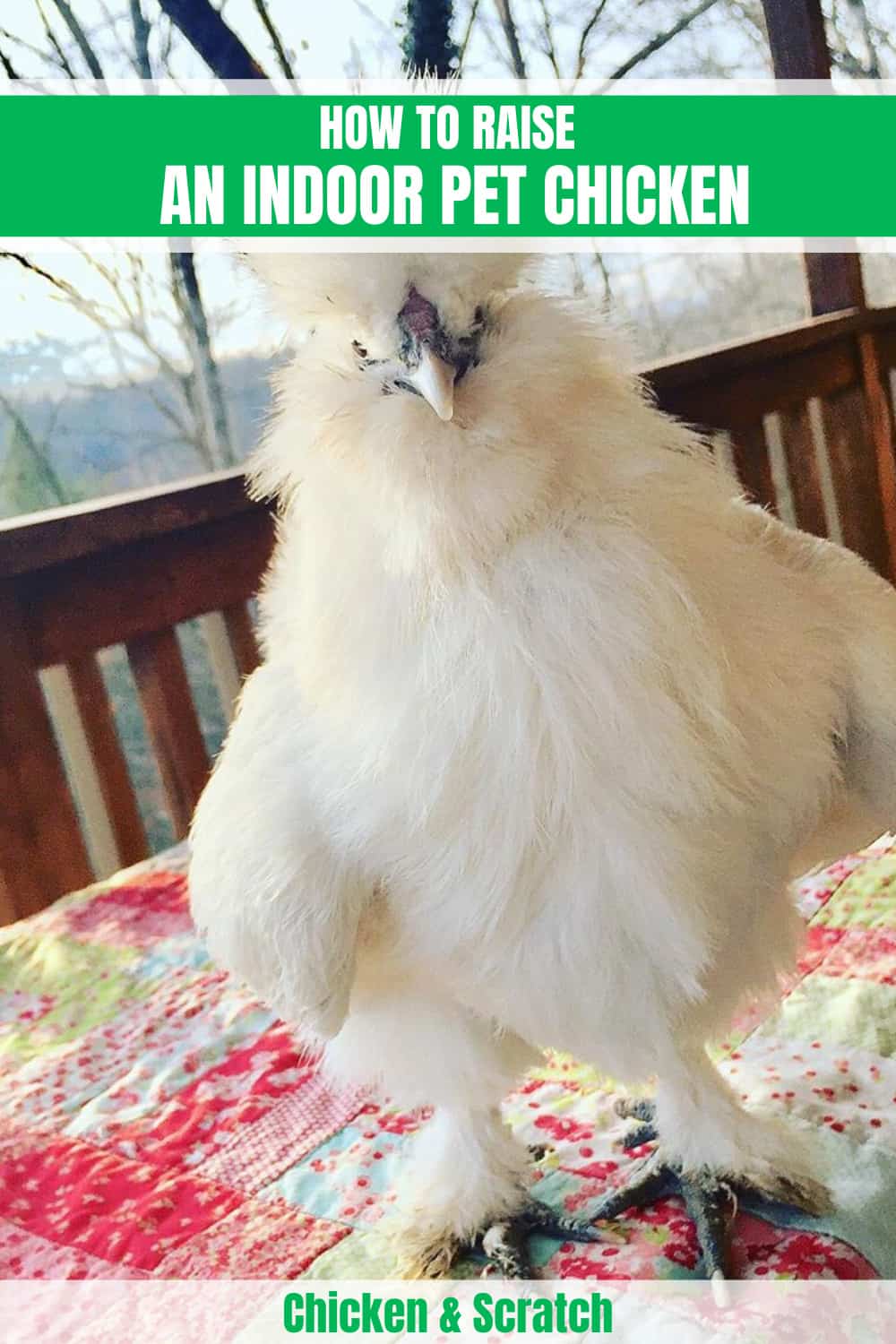
Many people cringe at raising a chicken right inside the house. Of course, indoor chickens aren’t like our typical pets, such as dogs and cats, but who says they can’t be indoor pets too? Here’s all you need to know about raising an indoor pet chicken.
An Indoor Pet Chicken
Chickens are generally outdoor birds. They need lots of space to run around and love foraging. However, they can also enjoy staying indoors. Having a chicken living with you inside the house might seem like a lot of trouble, but raising an indoor chicken can be fun and rewarding if done the right way.
The great thing about chickens is that contrary to what most people think, they can adapt quickly to your lifestyle. In no time, cuddling with you on the sofa and watching television will become second nature to them. This bonding can continue while they produce fresh eggs for you.
We got into the act of raising an indoor chicken by accident. It all started when our chicken fell sick and needed extreme care. We could not give her the attention she required without bringing her inside the house. We brought her in, and she became a part of the family before we knew it.
In a matter of weeks, she knew her way around the house and would run straight to the living room whenever the TV came on. It became such an enjoyable experience that when she got better, we couldn’t bring ourselves to send her back outside.
Things to Consider Before Deciding on Raising an Indoor Pet Chicken
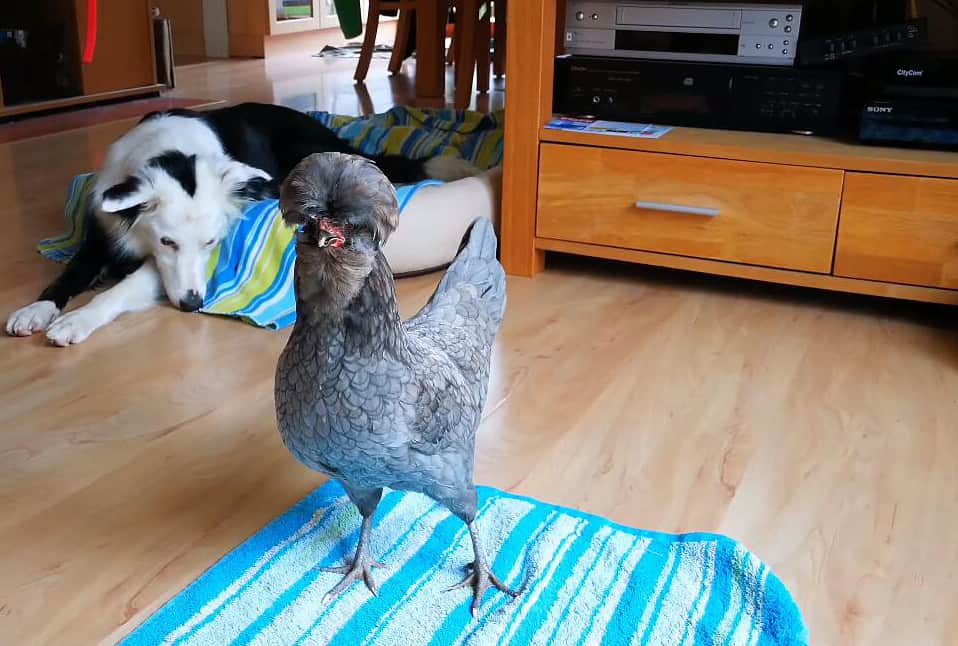
While the idea of raising an indoor pet chicken might be thrilling to you, there are a few things you must consider before deciding to raise one:
1. Chickens Create Dander and Dust
Chickens don’t have fur, but many people are allergic to the dust and dander they produce. Before raising a chicken inside your house, you must be sure that nobody in your family is allergic to chicken dust and dander. If anybody in your home is slightly allergic, you must find a place for your pet chicken outside.
Indoor chickens can cause mess as they tend to produce animal waste that has to be regularly cleaned out. They can also forage and peck in search of food which then gets tracked around the house.
Additionally, kick up dust from dirt baths can especially concerning if anyone in your home suffers from allergies or asthma. Chickens can also carry small parasites like lice and mites into your space which can affect both you and other pets in harmful ways.
2. It Takes a Lifetime Commitment
Are you ready to take care of the chicken indoors for her life? As mentioned earlier, a chicken finds it easy to adapt to its lifestyle, and if allowed to stay inside for a while, it would get used to that lifestyle and bond with you. Afterward, sending it back into the cold coop would be harsh after a long time of cozy living and bonding.
When you decide to raise an indoor pet chicken, you must be prepared for the chicken’s lifetime. A typical chicken lives for an average of ten years. That’s a long-term commitment, and you must consider this before deciding.
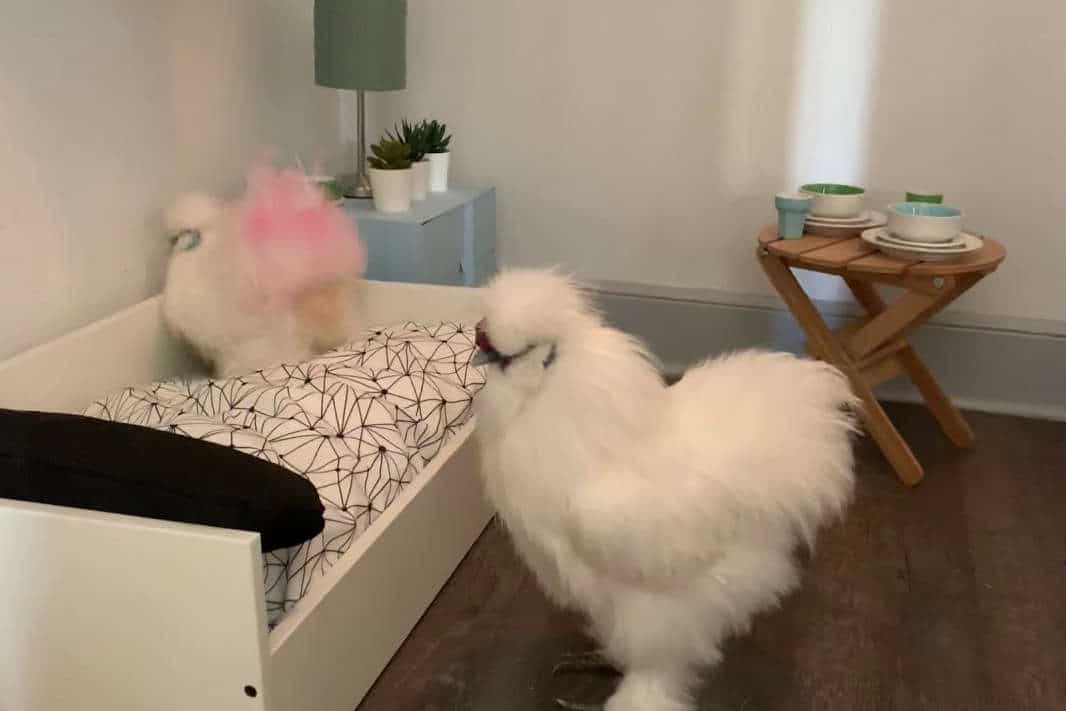
3. Are Pets Allowed in Your Apartment?
If you’re living in a rented apartment, you must check in with the landlord to know if you can bring in pets. If pets aren’t allowed inside, there’s a high likelihood that chickens wouldn’t be welcome too.
Also, they might allow normal pets but not a chicken. Although some breeds can be quieter than others, most chickens can be loud and obnoxious in an apartment complex.
4. Other Pets in the House
If you already have a cat or dog in the house, bringing a chicken might be a bad idea. The dog or cat could scare and even harm your indoor pet chicken.
This is because chickens are a natural prey in the wild. The pets already in your home can be triggered by the sudden appearance of another animal and cause them to harm your chicken.
Keeping track of all your animals is important, especially when adding new chickens indoors. It helps keep things organized between pets especially when it comes to managing and prevent disease transfer from one species to another.
Note that you should also quarantine your new pets for at least two weeks to keep the spread of disease. The chicken’s lice and mites could potentially be transferred to dogs and cats.
How to Raise an Indoor Pet Chicken
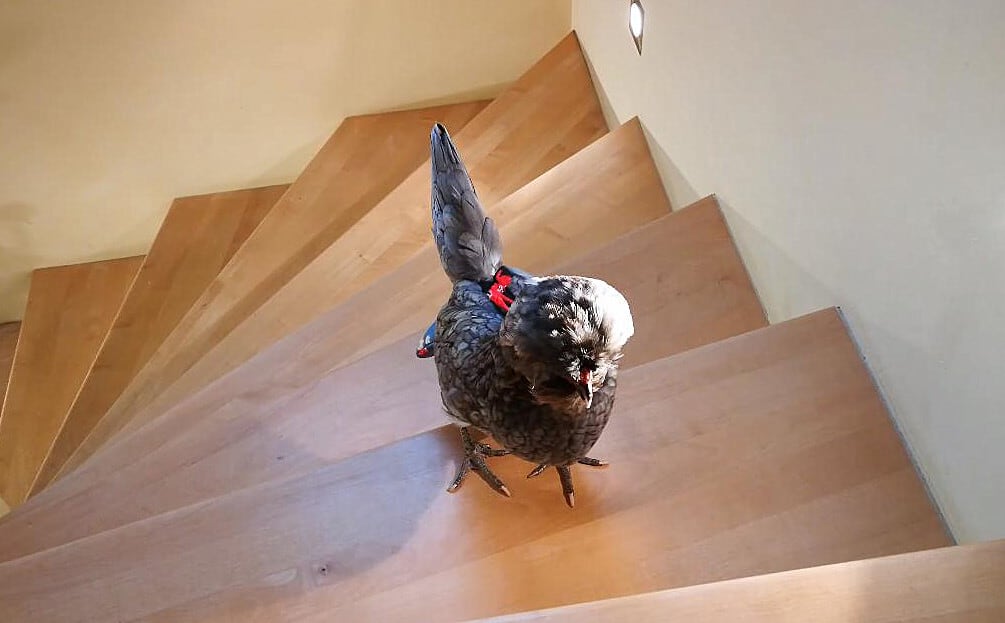
Now that you’ve checked all the boxes let’s learn how to raise an indoor pet chicken. Here is a step-by-step guide to help you navigate the entire process:
1. Choose the Right Indoor Pet Chicken
In choosing the proper indoor pet chicken, you’ll want to consider size and temperament. I prefer a hen to a rooster because the former is less excitable and gives fewer problems than the latter.
Besides size and temperament, the breed of the chicken also matters. It’s more convenient to raise some chicken breeds compared to others. For instance, the Silkie chicken is a friendly, quirky chicken that tops my list of the best chicken breeds to raise indoors.
She has lovely feathers that lack barbicels, making her fluffy in appearance. Also, the chicken has silky plumage, and if you have kids, they’d love her.
The Sultan Chicken is another chicken breed you can consider raising indoors. It’s an ornamental bird with a puffy crest and long tail. This chicken is elegant and non-aggressive, making her very easy to handle.
There are many other chicken breeds to choose from, and the following also make my list of the best indoor pet chickens: Cochin chicken, Barbu D’Uccles, and Polish chicken.
2. Prepare Where the Chicken Will Stay
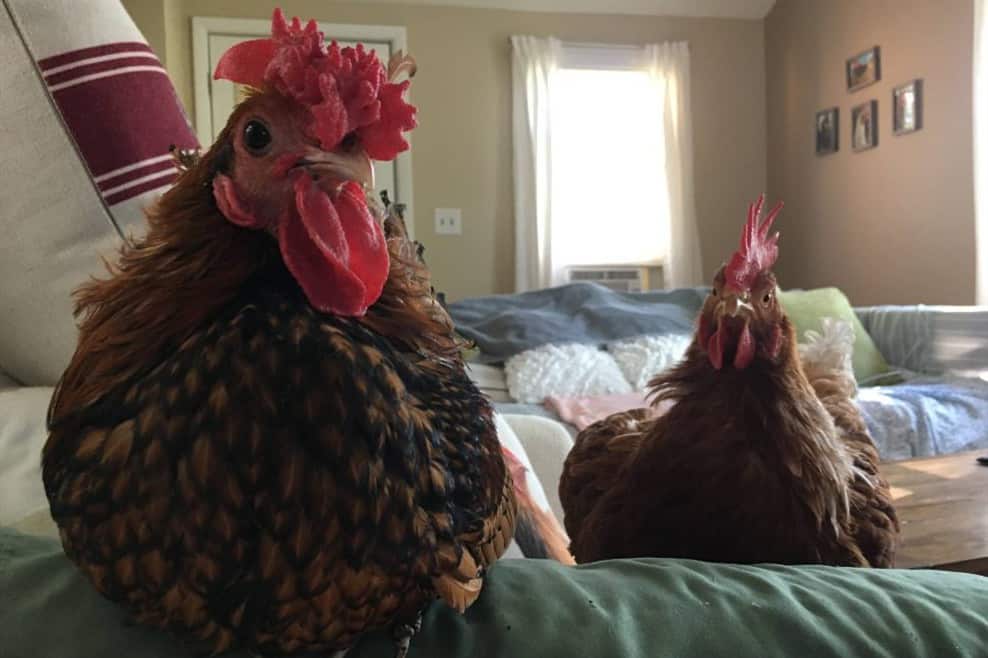
You have to decide if the chicken would have full access to all areas in your house or if it would be restricted to specific areas in your home. Limiting the movement of the chicken in your house is not a bad idea; some people leave only the ground floor or some other area open for the chicken. You also wouldn’t want your chicken to have access to your children’s rooms or other places where the chicken might walk into harm.
Also, you need to get an indoor chicken cage or coop so your chicken can play around without supervision. In doing this, you want to provide the chicken with the most natural environment as much as possible. This practice would mean adding things such as sawdust and straw.
The cage’s floor should have a substrate to help cushion the chicken’s body. Straw is the best substrate for the chicken’s bedding, providing warmth and a healthy germ balance. The cage should also have enough room for the chicken to eat, move about, and sleep.
Chickens love to take dust baths, which can often create a mess around their cage area. So, consider keeping the cage away from the kitchen and bedrooms. The areas around the cage should also be easy to clean, and I suggest you use linoleum flooring around the cage.
For proper hygiene, clean the chicken cage regularly. I recommend doing so at least three times a week.
3. Make Arrangements for the Chicken’s Poop
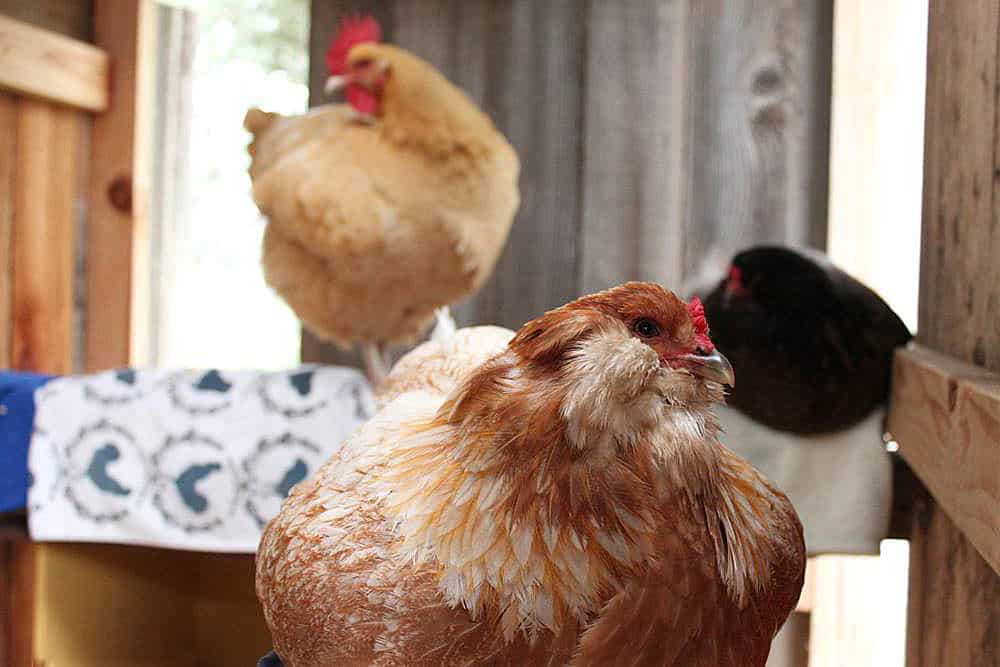
Getting a ‘poop plan’ is probably the most crucial step you have to take. Many people who consider raising a chicken indoors bizarre do so because they simply can’t imagine the chicken’s poop in their living room.
If you don’t get the poop arrangement right, you’ll be forced to send your chicken out sooner than you’d expected. Some chicken breeds give out more waste than others, so it’s essential to consider this when choosing a chicken.
Here are the best techniques we use:
1. Chicken Diapers
Yes, I know that sounds awkward, but there are chicken diapers. Just like the usual baby diapers, they help the chicken pet move about the house without you worrying about them messing up the whole place. Before getting diapers, ensure your chicken breed is well-suited for them.
2. Train Your Chicken Pet
You can choose to train your chicken, just like you would a puppy, with treats or a clicker to always use the litter box. To achieve this, put the chicken pet in a litter box when you notice she’s about to release waste and reward her with a treat afterward. That way, the chicken will begin to associate using the little box (good behavior) with getting treats.
After the chicken pet gets familiar with using the litter box, you can switch from using treats to using a clicker. The chicken will instinctively go to the litter box when she hears the clicker sound.
Some people prefer to clean up the feces as the chicken excretes them. Doing this is not very convenient, and there’s no guarantee you won’t miss some poop in some corners.
Caring For your Indoor Pet Chicken
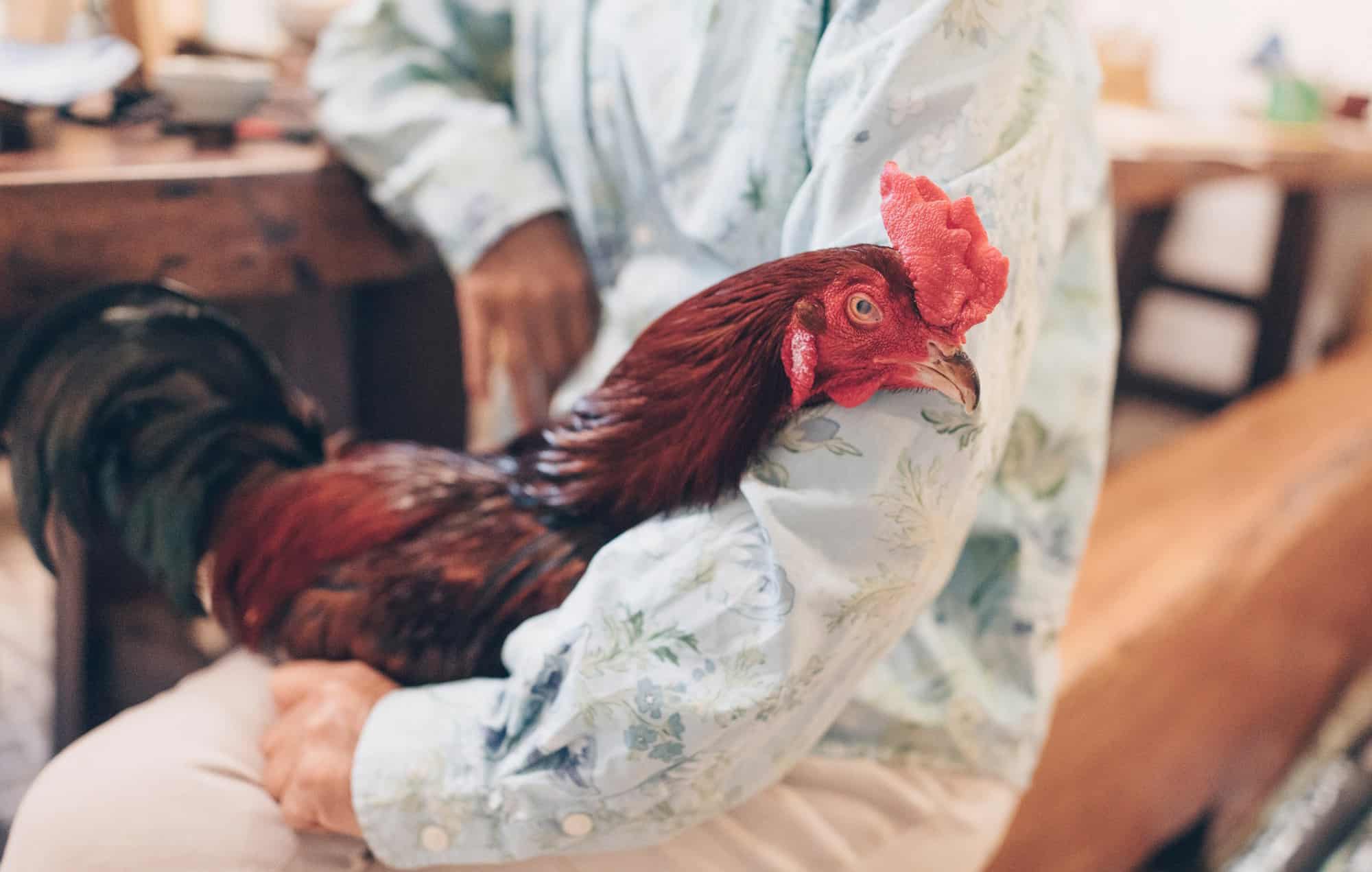
Once your chicken is inside, you’ve got to start caring for her immediately.
- Hygiene: Ensure you clean the chicken’s environment regularly and adequately.
- Clean and Fresh Water: Maintain a constant supply of fresh drinking water for your new pet. You can buy specially-made drinkers that prevent the chickens from falling into and drowning in them.
- Good Feed: Provide a pelleted diet for your pet chicken. Fresh feed is essential for the growth and health of a chicken. Also, supplement her diet with apple cider vinegar (ACV).
Apart from ACV, you can add other supplements such as crushed garlic, fresh greens, probiotics, and protein-rich ingredients.
Bonding with Your Pet Chicken
Bonding with your pet chicken is what makes her a pet in the first place. You have to observe your chicken daily to get to know her behavior and temperament. Doing this will also help you monitor the chicken’s health.
I talk to my pet chicken and call her by her name every time. I also enjoy mimicking her coos, clucks, and warbles because doing so helps me get closer to her.
Just like every other pet, show your pet chicken loads of affection. Make it a habit to gently rub the back of her neck, as every chicken loves that. When you’re not too busy, take out time to play with her.
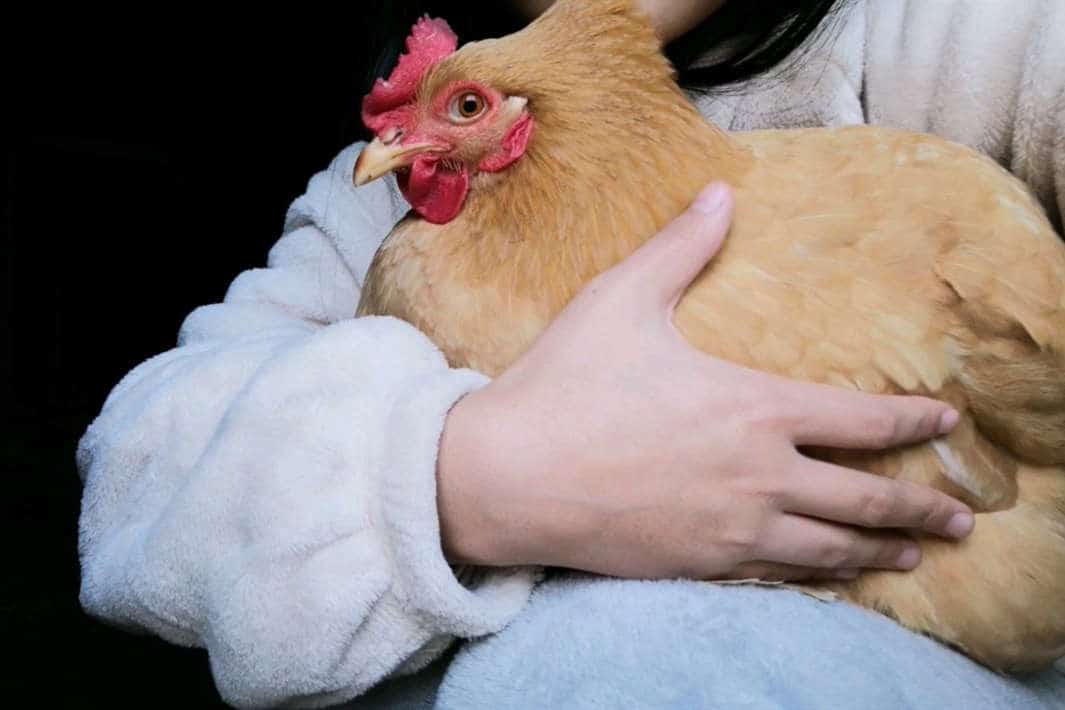
Give the Chicken Some Outdoor Time
Chickens love being outdoors, and your indoor pet chicken is no different. So, make room for your chicken to take a walk outside daily. Besides, sunlight helps with egg production.
Although the name suggests that indoor chickens should just be left indoors, there are some risk in not letting them out to the sun. These include lack of sunlight and Vitamin D.
Having outdoor time for your chickens is an incredibly important part of their well-being. They can safely follow their natural behaviors outside like scratching the ground, pecking at plants and insects, and exploring around. Doing this helps keep their physical health in shape by giving them space to fly freely and get some much-needed exercise.
Conclusion
Raising a pet chicken is not only feasible but fulfilling. As we’ve discussed so far, all you’ve got to do is put the necessary arrangements in place, and you are on your way to grooming a lovely family chicken.
Now, are you ready to raise a pet chicken?
- Plan for where the chicken will stay
- Have a ‘poop plan.’
- Be prepared to care for your chicken, and
- Be ready to bond with your pet chicken.
Feel free to drop any questions you might have in the comments box below. I’m happy to help.

Joseph Hudson has been raising chickens for over 15 years. In 2018, he completed the Agriculture & Natural Resources program at Mt. San Antonio College. He currently raises over 1400 chickens on his 7.5-hectare farm. He keeps sharing his experience on raising healthy and happy chickens on Chicken Scratch The Foundry.







What do you suggest using to keep the air around the coop clean from the dust from their faces?
An air purifier/ filter with negative ion emitter would work..
I have an indoor chicken her brother was having some outside time with her a few nights ago and got attacked by a snake. We killed the snake but didnt do it in time. Now it’s just her. She lives in my bathtub. I really want to get her trained for the litter box she is 3 months old. Can I still train her and exactly how. She sleeps with me and seems to do ok. But I still have to put a towel down and let her have her side of the bed. I know this sounds crazy but she flys from the tub to my bed when its nite time every since her brother died.
Should I be someone who works from home if I want a pet chicken?
My chicken is only a few days old and will only sleep and stay (relatively) quiet in my hand despite having a perfectly arranged and tempered box with food, water, towels, a heating lamp, and all that jazz. Do you have any suggestions?
My chick sleeps in her little box. I don’t have a heat lamp so I put her on a cuddly old washcloth & drape a heating pad on Low over that corner of the box. It makes a nice little nest in there for her & she sleeps quietly all night & until I get her up around 7:30 or 8 a.m.
omg how is she doing??? thats so cute!!!!
Can your chicken get away from the heat lamp? It might be too warm. Never leave an animal in a heated area without an option to get away from the heat and/light
I have a pet silky I’ve had her since she was one day old she lives inside my house with me i’ve had her since she was two days old. I need ideas on what to put her in inside like some kind of coop that I can put inside my house what would you suggest.
An oven
Lmao
I have a chicken, I suppose she’s a pullet because she’s not laying yet. She came in my yard a month ago, and refuses to leave. She’s an indoor/outdoor bird, she bullies my dogs and hangs out with them as well. I’m still trying to figure out her breed. It’s been a learning experience, and I appreciate all the pet chicken articles, I think she decided we are her flock, so I’m learning.
not sure if phone type matters, but there’s this app called “google”. you can put your image into it and it’ll help you find out
I’ve had a small outdoor flock of Banty breeds for decades, but about a year ago, since I moved to a new place on my own, I decided to get a Serama hen. Just 1. As a hobby Ethologist, I wanted to experience a 1 on 1 relationship with her. Knowing birds will often prefer to bond with another bird over a person. I did commit to getting her a flockmate if she needed one, but I was confident that I could provide lots of enrichment for her as I am Disabled & home all day. I also want to do Pet Therapy with her as I’ve found a lot of older patients prefer a hen over a dog!
I have dabbled with different coop substrates in her huge rabbit cage. She has a litterbox of bathing dust, she has a water bottle, toys that make sounds & release treats when she plays with it, simulating foraging behavior. She actually plays music on her bells & sings along.
She has run of the house but stays with me or in our bedroom. At night she roosts on top of my tv & when she wakes, she flies over on top of me to preen until I am up too.
She is mostly housebroken, is very fastidious & I even take her into the shower with me.
She gets all kinds of tidbits along with her pellets & she has gone thru 3 cycles of egglaying, a week or so of broodiness & then gears up to lay again. She, in fact, has a very specific place she nestles into to lay her eggs – my arms!
And she loves ppl, which is good – happy to sit in a lap when company is over & she keeps up a steady stream of coos, warbles, trills, etc. along with occasional clucking & squawks.
Overall, I find a house chicken is so much easier & fulfilling. I have a female German Shepherd & the 2 of them are very respectful of the other – that isn’t always the case when it comes to such a combo. I am lucky.
So I will also say having such a close bond with my hen is way more intimate than when I had a handful of them (& they were indoor in specially designed cages). Back then I had Seramas, Sebrights & Dutch Bantams. They all had run of the apartment supervised, daily & weekly, I bathed them all in the shower with me, which they loved – all perched on the rim of the bathtub & wrapped up in a towel burrito.
So I am a big fan of chickens as a house pet – there are a lot of pros & not many cons & they really are the cuddliest pets in the world!
You first, joe 😀